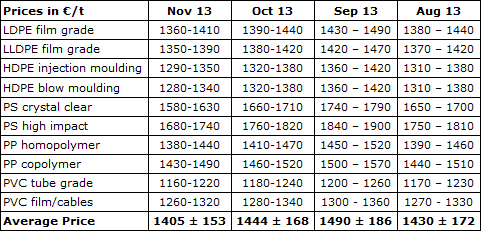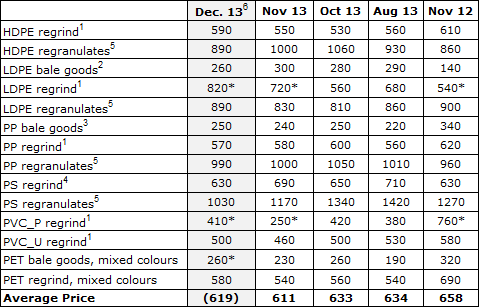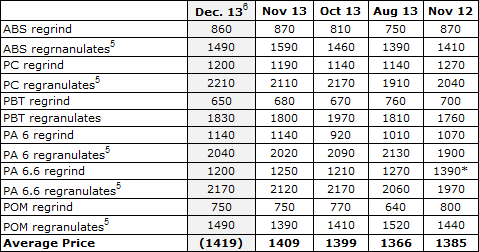Market Report Plastics - December 2013
Information about the market for plastics is being presented by:
bvse - Bundesverband Sekundärrohstoffe und Entsorgung e.V.
1. The market for primary plastics
The price indices published by KI Kunststoffinformation, cf. www.kiweb.de, show that the 2013 November prices of standard thermoplastics more or less equalled those attained in the previous year, while those of technical plastics were slightly lower. Or to put it differently, plastics production has more or less held its own at the previous year's level. The previews and estimates published by the economic institutes with reference to the economic developments for 2014 are favourable without exception - not only in Germany, but across the whole of Europe. Hence, the scenario displayed in 2013 is already now estimated to be the basic one for 2014; however, it will hopefully be subject to further improvement.
Standard plastics: Despite an increase in the demand for standard plastics, prices fell once again in November. The price slump was due to the decline in precursor prices. In November 2013 standard plastics prices fell short of those quoted in the previous year by 15 /t on average. The price rises in standard plastics indicated by EUWID in September 2013, cf. www.euwid-kunststoff.de, did not hold their own in the following two months, i.e. in October and November. While standard plastics prices were raised by approximately 60 /t on average from August to September, they fell by 56 /t in October and by 39 /t in November. The processors' hopes for falling plastics prices were thus met twice in a row. The price rise in polystyrene, attaining 90 /t, was above average in September. Hence, the price adjustments, equalling 80 /t each, were particularly significant in October and November. In December plastics producers reckon with an increase in demand because processors only have very few quantities on stock, which is why they wish to make purchases at favourable prices.
Table 1: EUWID quotes for standard plastics over the past four months; prices listed in /t

2. The market for secondary plastics
The preliminary annual balance shows that the 2013 business year has been rather difficult. The previous year's trends continued right into 2013. Plastics recycling is ultimately divided into two distinct segments: on the one hand, there are those plastics recyclers who provide the plastics markets with recyclates, which are sold in addition to the virgin materials for the plastics processing industry. On the other hand, mention should be made of those plastics recyclers who process mixed plastics with the aim of producing recyclates that provide substitutes for other materials in the further stages of processing, such as wood, cement or steel. Both segments supplement each other in an ideal manner and also depend on each other when it comes to completing the recycling process.
It is good to see that the price of processing input has fallen slightly and that there is a larger quantity of goods in the market, albeit of a slightly lower quality. Recyclates have been in great demand in 2013, too. The restrictive Green Fence Policy pursued by the People's Republic of China has had a stabilising effect on the recycling structures established in Germany. Furthermore, it is noticeable that plastics recycling is, on the one hand, becoming increasingly differentiated; on the other hand, more and more fields of activity are being integrated into the existing company structures. However, this also means that companies continuously have to expand their processing quantities so as to be able to offset declining profit margins.
It is bad to see that recyclers are often offered nothing but poor quality grades of processing goods. They mostly place just-in-time orders, which means that it is not possible to continuously sell recyclates in sufficient quantities. Smaller-scale plastics recyclers are disappearing from the market. As a result of the steadily increasing wage and energy costs, plastics processing prices are rising in Germany. The expenditure for bureaucracy, including duties and commitments that are subject to frequent change due to the dense regulatory framework, are raising the production costs in Germany to such an extent that they lead to distortion of competition. There is a certain danger that the reimbursements of increased energy costs, which have only been granted to a small number of recyclers up to now, might be revoked for the recycling sector as a whole.
Some experts expect the demand for secondary plastics to rise in December. However, the market fluctuations that have taken place to date suggest that the Christmas holidays will be quiet. The December quotes for processing input, i.e. used plastics, might slightly decline because there are still larger quantities of unsold goods in the market.
To date, 30th November, i.e. the date which marked the end of the Green Fence Action, has not had any impact on the plastics markets. The demand for imports from the People's Republic of China is expected to be rather restrained as a result of the Chinese New Year's celebrations: there will be public holidays there from 31st January 2014 to 2nd February 2014.
According to the EUWID magazine, the prices of some standard plastics quoted for November 2013, post-user goods in particular, fell compared to the previous month. The six price falls indicated by EUWID range between 5 /t and 15 /t. However, the majority of the quotes remained unchanged. The plasticker internet platform also shows price decreases of 22 /t on average. Hence, plasticker indicates more considerable price adjustments than EUWID. However, on the whole these price adjustments can be assessed as being more or less insignificant, which means they indicate price stabilisation.
2.1 EUWID Price Watch
According to the EUWID Price Watch for Used Plastics, standard plastics have held their own. Only the prices of very few quality grades have been adjusted. According to reports by EUWID, the majority of recyclers are having a longer winter break, which will last until 6th January, i.e. Twelfth Night.
Post-industrial PE has held its own. In the case of post-user PE, the prices of mixed film, HDPE hollow bodies and colour-separated regrind from crates have fallen by 5 /t to 15 /t: mixed film (90/10) 250 - 280 /t, mixed film (80/20) 240 - 260 /t, HDPE hollow bodies, mixed colours (C 29) 140 - 260 /t and HDPE regrind from crates, colour-separated 650-830 /t.
Post-industrial PP: Only two quotes have changed, namely: Film mixed colours (K59) 120 -270 /t and Film natural (K50) 330 - 340 /t. The quotes for both quality grades have declined by 10 /t on average. Even though the PP markets are still subject to change as a result of the intervention by the Dual System, they are gradually stabilising again.
Post-industrial PS and PVC have held their own. PS processing goods are still in great demand. PVC is expected to come to a halt in winter due to seasonal influences. The winter is still mild in Germany, which is why there is still a stable basic demand for PVC from the building industry.
The PET market: The situation in the PET market is still difficult. The PET virgin material prices fell by 45 /t in November. The market for secondary PET is still characterised by a good supply at all stages of the production process. For instance, there is still a sufficient supply of bale goods, and that despite the decrease in beverage consumption during the winter. Recyclers are adapting their production of regrind and regranulates to meet the corresponding demand to the largest possible extent. According to PET recyclers the winter break is rather long. Prices have changed markedly since last year, e.g. within one year the quotes for transparent bottle PET have fallen by 105 /t and those for coloured PET have decreased by 100 /t. According to EUWID, the November prices of transparent PET and coloured PET fell by 15 /t each relative to the previous month. The following prices are thus quoted: PET transparent 250 - 280 /t and PET coloured 70 - 100 /t.
2.2 plasticker price index
The plasticker internet platform publishes quotes on an hourly basis. However, the present market report shows the final monthly prices. The preliminary quotes previously accumulated are only represented during the reporting month in question, in this case for December 2013 - these quotes merely reflect an interim situation that does not become definitive until the following month.
Standard plastics
In November the listings for standard plastics were, once again, inconsistent. The November quotes fell short of the previous month's by 22 /t on average; prices rose by 20 /t to 60 /t, while prices fell by 10 /t to 170 /t. In total, plastics prices held their own. Demand slightly decreased compared to the previous month.
Having attained their peak levels at 1420 /t in August, at 1340 /t in October, at 1170 /t in November and at 1030 /t in December, PS regranulates have been falling considerably again. HDPE regranulate prices have fallen in November and December, thus attaining roughly the same quote as in the previous year. LDPE bale goods peaked at 300 /t in November 2013. According to plasticker the following prices changed by more than +/- 40 /t compared to the previous month: HDPE regranulates - 60 /t, LDPE regrind + 60 /t, PP regranulates - 50 /t and PS regranulates - 170 /t.
The first preview of the December quotes, whose final listings cannot be published until January 2014, shows that the average price will probably be 619 /t. Hence, the plasticker internet platform indicates price stabilisation in standard plastics on 15th December 2013. Demand has been restrained in December.
Table 2: Standard plastics prices according to plasticker, quoted in /t.

*: Supply figures too low to attain statistical significance; 1: equivalent to the grade "post-industrial, mixed colours"; 2: equivalent to K49; 3: equivalent to K59; 4: equivalent to "standard, mixed colours"; 5: equivalent to the grade "regranulates, black", 6: forecast (may be amended by additional quotes)
Technical plastics
On the whole, the November quotes for technical plastics changed only slightly compared to the previous month. The November prices exceeded those attained in October by 10 /t on average, with prices rising by 10 /t to 130 /t and falling by 20 /t to 170 /t. A comparison between the November quotes for 2012 with those for 2013 shows that prices were raised by 24 /t on average by gradations. According to plasticker the following price quotes changed by more than +/- 70 /t in November: ABS regranulates + 130 /t, PBT regranulates - 170 /t and PA 6.6 regrind + 120 /t. In November the demand for technical plastics fell slightly. Since August 2013, when they attained 1910 /t, PC regranulates have shown a continuous upward trend, reaching 2210 /t in December 2013. Over the past three months, polyamides have attained largely stable to high prices with respect to regrind and regranulates.
The first preview of the December quotes, whose final listings cannot be published until the beginning of January, indicates an average price of 1419 /t. Hence, the preliminary December quotes published by the plasticker internet platform for technical plastics on 15th December 2013 will hold their own. To date, technical plastics have been in stable to good demand in December.
Table 3: Technical plastics prices according to plasticker, quoted in /t.

5: equivalent to the grade "regranulates, black". 6 forecast (may be amended by additional quotes)
No guarantee for any of the prices. All EUWID prices are quoted ex works. As a rule, the prices quoted refer to quantities in excess of 20 tons. The monthly quotes for secondary plastics, which are updated on an hourly basis, can be calculated using the price lists that are derived from the quotations published in the raw material exchange plasticker. The prices listed in this index are quoted with reservation - as the majority of the quotes submitted are not necessarily equivalent to the sales prices. Furthermore, plasticker does not distinguish between the following grades: transparent, mixed colours or colour-separated. Therefore, the information provided by plasticker may indicate different market behaviour than the prices quoted by EUWID. Plasticker offers the quality grades regrind and regranulates in the form of both virgin materials and secondary materials.






